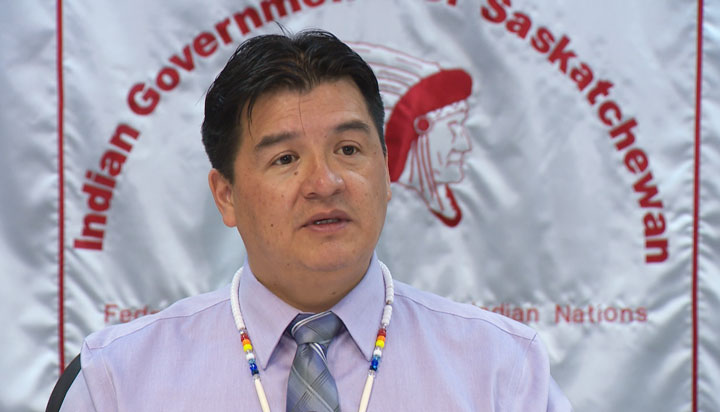The Federation of Sovereign Indigenous Nations (FSIN) is considering legal options if the Saskatchewan government doesn’t stop the sale of Crown lands and let First Nations participate in the process.

In a letter sent to the province, FSIN Chief Bobby Cameron outlined that lands should not be sold while there are outstanding land claims and landless First Nations in the middle of negotiating their land base.
“The Treaty Land Entitlement and Specific Claims First Nations were never allowed to participate in any of these land sale programs, despite the legal obligations the provincial government has towards the First Nations,” Cameron wrote in the letter.
“We can no longer sit idly by while the provincial government disrespects our treaty rights. If they are not willing to work with us on a political solution, then we will see them in court.”
READ MORE: Incentive program announced to sell Sask. agricultural Crown land
Wally Hoehn, an executive director with the Saskatchewan Ministry of Agriculture lands branch, said that if it comes to legal action, lawyers will be involved.
“When we are dealing with treaty land entitlements or duty to consult we work with a number of other agencies within government and that’s what we’re doing, collaboratively we’re looking at everything and then we’ll draft a response back to FSIN,” Hoehn said Tuesday.
“We understand the urgency that they put in their letter and so we’ll try and respond as soon as possible.”
FSIN officials said the provincial government has failed to consult and accommodate the Treaty Land Entitlement and Specific Claims First Nations of each new land sale program.
Hoehn said he’s been working in his field for 30 years and selling the province’s Crown lands publicly is nothing new.
“We’ve done this for a number of years. There’s vacant land that becomes available either through a client surrendering his lease or potentially if we cancel a lease. There’re a surplus to our portfolio and so we’ve always put them up for sale,” Hoehn said.
“If a parcel becomes vacant then the review is to canvass a bunch of internal agencies … to see if there’s any other government interest in that land and if there is, we wouldn’t put it up for sale but if there are no other government interests then we put it up for sale. That canvass doesn’t include First Nations.”
READ MORE: New guidelines for Sask. conservation officers entering First Nations land
In October 2016, the Ministry of Agriculture undertook a pilot project and changed one aspect of how Crown lands are sold. Sixty-two parcels across Saskatchewan are currently for sale in an online auction that closes on Friday.
“Previously, we always used a tender and so our clients have indicated to us that a lot of them are farmers and ranchers and so they’re quite used to the online auction process and they really like it so that’s why this is the first time we’ve tried it,” Hoehn said.
FSIN officials said they have regularly been denied the chance to participate in these land sales and are in discussions with several First Nations on legal options.
“The provincial government has legal obligations to First Nations with outstanding land entitlement which it must live up to,” FSIN vice-chief Dutch Lerat said.
“The implementation of these TLE settlement agreements is critical to the economic success of those First Nations.”
READ MORE: Previously protected Crown land to be sold to Saskatchewan farmers
Hoehn said First Nations can select any parcel of available Crown land and it then goes through a review process within government. He added that First Nations have to get an existing lessee to agree to the purchase and negotiate any third-party interests.
“Part of our process is we have to do duty to consult and there were 15 parcels that we started duty to consult in January of this year and there’s only 10 of those parcels on the tender sale. Five First Nations and a Métis community expressed an interest in them and there wasn’t enough time … so those five we didn’t put on the auction sale,” Hoehn said.
“We always take our responsibility, whether it be under the Treaty Land Entitlement framework or agreement or specific claims agreement or even duty to consult, seriously … I’m confident that we’ve met all of our obligations.”


Comments